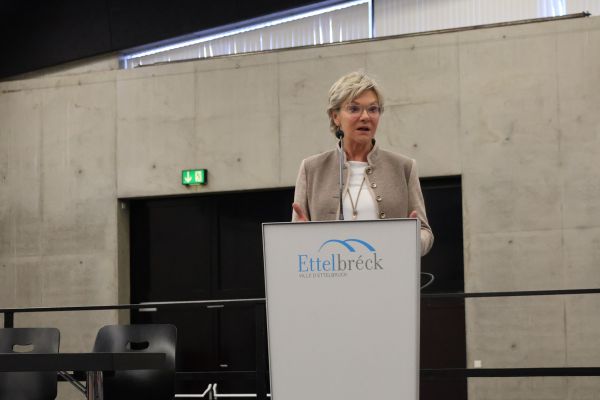 Martine Hansen, Luxembourg's Minister of Agriculture, Food and Viticulture;
Credit: MA
Martine Hansen, Luxembourg's Minister of Agriculture, Food and Viticulture;
Credit: MA
On Monday 2 December 2024, Luxembourg’s second “Day of Agriculture” (Dag vun der Landwirtschaft) took place in the Däichhal in Ettelbruck.
In the presence of the Minister of Agriculture, Food and Viticulture, Martine Hansen, the Service d’Économie Rurale (SER) presented the results of Luxembourg agriculture for 2023 and forecasts for 2024.
Over 400 participants from the agricultural sector exchanged ideas on current developments, innovations and challenges. Those present learned about key topics such as the current market situation, innovation and advice, AMS controls and measures to reduce ammonia emissions and bluetongue disease. A question-and-answer session took place afterwards.
The report showed that the average operating profit of Luxembourg's agricultural sector fell by 29% in 2023, compared to the previous year, and stood at €83,400 per farm. Nevertheless, the result remained above the five-year average (€74,220) and showed the resilience of the sector, according to Luxembourg’s Ministry of Agriculture, Food and Viticulture. Particularly high producer prices in the dairy industry and targeted subsidies under the new agricultural policy have helped to stabilise the results. This applies especially to more extensive production sectors such as beef production. For 2024, the SER forecasts an increase in operating profit of 11% to €92,800, mainly due to lower production costs.
After a turbulent 2022, the markets for agricultural products and production resources stabilised significantly in 2023. Milk prices continue to rise and market prices for meat remain stable at a high level. Oil crops such as rapeseed are still in high demand with good prices, while grain remains at a low level. These developments indicate that economic conditions for many farms are likely to continue to stabilise.
Another topic on the agenda was the promotion of innovation in agriculture. The new "Agri-Innovation" contact point will offer farmers a platform, from 2025, to develop and implement future-oriented projects. The funding catalogue for agricultural advice is being expanded and the application processes are being digitalised. The aim is to offer companies competent and neutral advice that supports them in the sustainable production of food, compliance with environmental requirements and adaptation to climate change.
Minister Hansen added: "Luxembourg agriculture is proving that it is both adaptable and future oriented. With ambitious goals, such as reducing ammonia emissions, and an expanded range of advice, we are supporting the sector in developing sustainably while remaining economically successful."
Animal health was also discussed. A comprehensive vaccination strategy was announced for 2025, to ensure that sufficient vaccines against bluetongue are available. Moreover, procedures are already underway to procure vaccines against two other diseases: bluetongue serotype 8 and epizootic haemorrhagic disease. These diseases are reported to be currently spreading from the west of France and could reach Luxembourg in the coming years.
According to the report, ammonia emissions are declining, with the reduction in synthetic nitrogen and the increased use of ground-level manure techniques reported to be contributing significantly to this result. Other measures such as nitrogen-reduced feeding and optimised herd management are increasingly being integrated into practice - a process that the Ministry of Agriculture, Food and Viticulture said it is actively supporting, to promote broad implementation in agriculture.
Minister Hansen praised the commitment of farmers, who have shown that agriculture can contribute to environmental and climate protection, concluding that: "It is impressive to see how agriculture demonstrates its stability and adaptability even in difficult times. The results show that we are on the right track - both in the economic area and in the implementation of sustainability measures."








